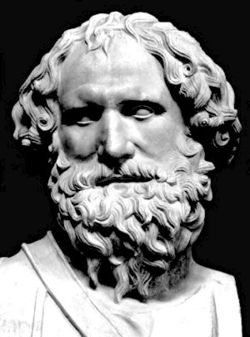Questions of meaning
“"What is good in this world?" Noodles. And really good blowjobs”
– Gandhi
“"What is evil?" Many things in this cruel world filled with suffering are evil. Evil is the greatest threat to us my brother, and it manifests itself in many forms, but none so self-destructive than kitten hugging. Many a young Buddhist I know has fell foul to these substance abuses”
“"What is beauty?" Look in the mirror. No seriously, I was joking. You didn't actually look did you? Stupid girl...you think you're pretty? Jim's just using you for all the sex”
– Caring friend
“"What is valuable?" My car dawg. It's one phat rod”
– 50 Cent
Questions of meaning are all about questioning the meaning of our existence, and sometimes whether we exist at all. In foremost, they enable us to truly understand who we are as humanity, and how to make the most of our lives, whilst also enabling a few profound thinkers to come up with some unanswerable questions and get paid a rather hefty sum to attempt to answer them. Pretty unfair, I hear you say? Well, maybe you should ask yourself the following questions...
What is the meaning of life?[edit | edit source]
Nothing sums up the entire philosophical movement better than the above question of meaning. Some believe philosophy is in fact the meaning of life, but these people would in fact be mistaken, as they would have to be philosophers in order to make such a statement - which automatically makes everything they say wrong. Indeed, one by this point would probably say that the best way to answer this question would be with silence, or failing that, Chuck Norris or kitten huffing, which seem to bring much joy into many people's lives. But the masses could still be wrong. As you may have guessed, there are many potential answers to the culmination of thousands of years work from overtly sensitive balding males, creating in principle a paradox of a paradox.
What is a paradox?[edit | edit source]
Is your brain stewing yet? Do you have a brain? What is this stew I speak of? All exemplar questions of thought, reminiscent from the great father of philosophy himself, Archimedes. Little is known of his life - although it is known he was born in 287 BC in the Greek city of Syracuse, and developed a natural tendency for counting inanimate objects from an early age. This was interpreted as a sign the child had been blessed by The Gods with a talent for maths, although this has been refuted in modern philosophy with questions amongst, "what does it mean for us if he had OCD instead?", "Is it contagious? I hope I don't catch it." and, "Should I wash my hands now? I think I should."
After his parents spotted his talent, he was quickly sent to a remote hilltop village in rural Greece to be tutored. Archy quickly grew bored of his teacher, and began to excel him particularly in the study of mathematics, procuring and proving several theorems before the age of 11. It was at this point that Archimedes began to go beyond simply questioning the things he saw in life, events ocurring around him, and began to ask what these things meant to him. Such queries included simple observations, such as, "Wow! The sun is very big.", profound questions such as, "What exactly is the soul?", and, "What would my Dad do if he knew?" Note that it is highly important that we will never know the answer, as the whole point of philosophy and questions of meaning is that there is no definitive answer to any one question (a poor excuse for a poor work ethic).
We will never know what Archimedes' dad did when he was told this mysterious secret, as such records were lost in the sands of time, along with much of Archimedes' life, which is a great tragedy, but his work lived on through his proteges. All that is known after this point in his life is that Archimedes died during the Roman invasion of Syracuse when he was approximately 52 years old, at the hand of a Roman's sword, which was also 52 years old. Some find some irony in this fact, but some more abstract philosophers believe that this was no coincidence, and for some reason Archimedes was sending us an encoded message saying that in fact 52 was the answer to the universe, life, and everything, and not the widely accepted 42. This is still an ongoing debate - but as with most things in philosophy is predicted to rage on for hundreds of years, before one slightly better than average philosopher smokes some "inspiration" and the answer comes to him in a vision. Back to the point, rumour has it that the sword unleashed when its owner became angry at the refusal of his request to Archimedes, but the exact demands are yet again disputed amongst historians, mainly because they weren't there and have no realistic chance of proving a thing. Whatever happened, Archimedes was left groaning on the floor, immersed in a pool of freshly outed liquid, gasping for breath.
Archimedes was truly the father of philosophy, and if he were still alive today we definitely could learn a thing or two! Philosophy has branched out since then, and after Archimedes spread his concepts to the world it truly erupted into a glorious fountain of self conciousness. To help you understand more about questions of meaning, some more contradictory questions are listed below, complete with contradictory answers from various different scholars, some full time philosophers, some only part time losers.
And of course, one last question for you to ponder now that you have nearly finished the article.
Where did those five minutes of my life go?[edit | edit source]
Hey, I never asked you to read this. You've only got yourself to blame...

